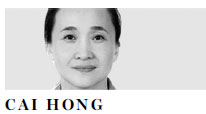Unlike many other countries, robots a bonus for Japan
Updated: 2015-12-01 08:22
By Cai Hong(China Daily)
|
|||||||||
 |
|
A robot made in China is displayed at the World Robot Conference 2015, which opened in Beijing on Nov 21, 2015. The conference has attracted more than 100 experts. [Photo/China Daily] |
I was blown away the other day when on seeing a smart coffee making machine at a robot fair in Tokyo. High-tech robots are replacing humans in almost every sector, from car manufacturing to cooking, and from caretakers for the elderly to receptionists, in the archipelago country.

In his new book Rise of the Robot: Technology and the Threat of a Jobless Future, Silicon Valley entrepreneur Martin Ford forecasts a tomorrow where sophisticated and ruthless cost-effective robots would eliminate the need for that anachronistic thing "once" called "job". Controversial as it is, the book has nabbed the 2015 Financial Times and McKinsey Book of the Year Award.
Industrial robots can work 24x7 if necessary and do not require breaks. They do not eat, commit mistakes or get tired. They don't claim overtime or draw pensions after retirement. Robots can perform tasks at less cost and do work in a manner that cannot be replicated by human workers in the manufacturing industry.
It is no surprise then that the "intelligent machines" are being widely used across the world. The rise of these machines in the workplace has prompted US and European experts to forecast massive unemployment and tumbling wages.
This is not the case in Japan, where robots are welcomed by the government as a convenient way of offsetting the effects of the country's aging population, shrinking workforce and public aversion to immigration.
Addressing the country's businesspeople at Japan's Robot Revolution Initiative Council on May 15, Japanese Prime Minister Shinzo Abe urged them to "spread the use of robotics from large-scale factories to every corner of our economy and society". He seemed determined to make the "robot revolution" the driving force of Japan's economic growth and help maintain the country's status as the "king of the robotics hill".
With Japan's declining workforce, job displacement will not be as much of a barrier to rolling out more robots as it would in other developed countries. For Japan, the robot revolution is an imperative. With 26.7 percent of the population 65 years or older, Japan is banking on robots to replenish the workforce and care for the elderly.
Japan's unemployment is at an 18-year low of 3.3 percent, which the Bank of Japan regards as near full employment. Vacant positions are at a two-decade high as the economy recovers.
Related Stories
Help on robot technology sought abroad 2015-11-24 08:11
China seeks robot technology assistance worldwide 2015-11-24 07:15
Rope-climbing rescue robot to minimize loss in disasters 2015-11-09 09:54
Robot exhibition to attract eyeballs in CHTF 2015-11-05 16:34
Today's Top News
Inspectors to cover all of military
Britons embrace 'Super Thursday' elections
Campaign spreads Chinese cooking in the UK
Trump to aim all guns at Hillary Clinton
Labour set to take London after bitter campaign
Labour candidate favourite for London mayor
Fossil footprints bring dinosaurs to life
Buffett optimistic on China's economic transition
Hot Topics
Lunar probe , China growth forecasts, Emission rules get tougher, China seen through 'colored lens', International board,
Editor's Picks

|

|

|

|

|

|







